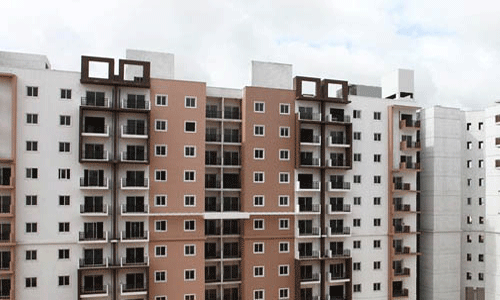
Investments in Punjab may slowdown due to state elections: DLF
Investment in real estate sector in Punjab may slow down due to Assembly elections in the early part of next year, a senior official of DLF India said in Chandigarh.

Investment in real estate sector in Punjab may slow down due to Assembly elections in the early part of next year, a senior official of DLF India said in Chandigarh.

Government intervention is needed in India to bring regularization in unorganized real estate broking, says a report by Netscribes, a knowledge consulting solutions company.

Equinox Realty,an arm of oli-to-steel conglomerate Essar Group,plans to sell a minority stake in its biggest commercial asset in Mumbai to raise between 7.5 billion rupees and 10 billion rupees, sources close to the development said.

The real estate market of Goa is also expanding not only in terms of buyer interest but also geographically. The once-limited property market is now spreading across new areas, offering a wider variety of options to buyers. Alongside this expansion, there has been a notable rise in property prices. What was once a market catering to properties valued between Rs 5 crore and Rs 15 crore has evolved, with some villas now fetching prices of up to Rs 100 crore. This surge reflects the growing interest from ultra-high-net-worth individuals who are seeking exclusive, luxury homes in the region.

In a report titled, ‘Fortifying India’s I&L landscape with a new manufacturing growth formula’, property consultant CBRE claims that the manufacturing sector’s growth has significantly contributed to warehousing demand. The share of sectors catering to the manufacturing space, including engineering & manufacturing, electronics & electricals and auto & ancillary sectors, within the total warehousing demand across major cities, has increased substantially, growing from 15% in 2019 to 24% in 2023 and 25% in H1 2024. The total leasing for warehousing from these manufacturing-related sectors stood at 4.1 mn. sq. ft. in H1 2024.

This long-term growth in real estate is underpinned by six salient growth levers which includes, rapid urbanization, infrastructure development, digitalization, demographic shifts, sustainability and investment diversification; all of which will form the bedrock for a quantum leap in Indian real estate by 2047. These long-term growth ingredients will be pivotal in the expansion of Indian real estate – from under a trillion currently, to potentially a USD 10 trillion market by 2047, accounting for a 14-20% share in the country’s GDP.

This strategic growth is expected to be driven by a focus on innovation as these companies seek to enhance their technological capabilities and market presence. Moreover, emerging technologies are projected to generate approximately 4.7 million tech jobs over the next five years across diverse sectors, including manufacturing, retail, education, finance, and insurance. This surge in job creation underscores the growing importance of technology across industries and highlights the need for a skilled workforce to meet the evolving demands of the digital economy.

Understanding the mindset of Indian real estate has never been easy. The built environment of the Indian real estate could argue and demolish the best of consumer-centric reforms. Remember the way industry body CREDAI had called RERA prior to its inception, and that too in front of the then Union Minister Kamal Nath, builder harassment and public amusement bill. But at the same time they celebrate the self-inflicted injury on many occasions. Track2Realty finds the overtones of the sector all the more contradictory with the Union Budget, before and after the budget.

If the removal of indexation benefits with Long Term Capital…

The report also highlights that Bengaluru has cemented its status as the leader for global capability centres (GCCs), commanding a 41% share in India’s GCC leasing market (from 2022 to Jun’24). Bengaluru’s GCC growth is driven by a combination of factors, including a skilled talent pool, premium Grade-A assets, and a well-developed IT ecosystem. The city’s ease of doing business also contributes significantly, making it an attractive destination for GCCs. Additionally, the scope of scalability in both assets and talent resources further reinforces Bengaluru’s position as a leading commercial hub.
